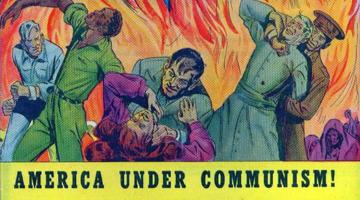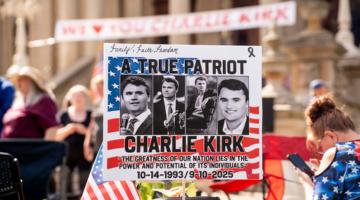The ruling class is once again in a frenzied state, seeking to crush political dissent and a growing class consciousness with an iron fist in another wave of repression.
On a bitterly cold December morning in 1919, prison guards at Ellis Island roused 249 shackled deportees from their bunks and trundled them to a Brooklyn pier where they walked a gangplank to board a retired warship, heading for Europe.
The repurposing of Ellis Island into a holding cell for a mass deportation is incongruous with the landmark’s iconography and the Statue of Liberty that soars above New York Harbor like a hallucination, beckoning émigrés from across the Atlantic.
“Give me your poor, your tired, your huddled masses,” begins the inscription on the monument that was gifted by France in 1885 as a gesture of friendship with the emerging industrial superpower that also espoused—at least putatively—the values of liberté, égalité, fraternité.
Befitting a European settler colony founded on genocide and slavery, however, the U.S. is not one thing or another, but all things and its other, as evidenced by the 1919 purge of political dissidents, the most celebrated of whom was Emma Goldman. Born in tsarist Russia in 1869, Goldman immigrated to the U.S. in 1885, and quickly became a thorn in the side of the American ruling class. Known for her writing and speeches advocating radical anarchist and feminist ideals, she was convicted of inciting a New York City riot in 1893 and sentenced to one year in prison after exhorting her audience:
If they do not give you work, demand bread. If they deny you both, take bread.
Eight years later, in September 1901, police arrested her again after President William McKinley’s assassin, Leon Czolgosz, said he’d been inspired by one of Goldman’s lectures. She was interrogated and released but a pattern of government harassment had been established. She was arrested in January 1903 for being a “suspicious” person, in 1907 for making “incendiary” speeches, and in 1916, she was convicted of violating a New York law that forbade lectures on birth control. She paid a fine, and continued to lecture on the subject until she was arrested again, convicted, and sentenced to 15 days in jail in lieu of paying another fine.
Everything changed the following year, however. Spooked by the Russian Revolution, returning African American soldiers who were emboldened by their military service in World War I, and the largest strike wave in U.S. history, Congress effectively criminalized free speech by passing the Espionage Act in 1917, followed by the 1918 Immigration Act enabling the government to deport anarchists.
That set off what Goldman described as a “deportation mania.” She was returned to the country of her birth officially for encouraging young men to dodge the draft but her real crime—and that of her fellow deportees—was challenging American capitalism, and refusing, in a sense, to be “white.”
In 1919, Attorney General A. Mitchell Palmer began rounding up political dissidents for arrest and deportation, drawing heavily from the pool of 13 million immigrants from southern, Eastern and central Europe who had poured into the country since roughly 1885. This purge, which led to the creation of the FBI, culminated in the execution of the Italian anarchists, Nicola Sacco and Bartolomeo Vanzetti, for a fatal armed robbery in 1920, despite scant proof of their guilt.
At issue was the question of consolidated whiteness which was largely foreign to the wave of European emigres who did not think of themselves as “white” but as Italians and Hungarians and Czechs. Combined with their identification with anarchism and Marxism, that made the newcomers especially dangerous to the American industrialists who relied on racism to police their workforces by pitting their employees against each other rather than uniting against the bosses.
In a speech to Congress, President Theodore Roosevelt warned that ‘‘every farsighted patriot should protest, first of all against the growth in this country of that evil thing which is called ‘class consciousness.’” In February of 1919, Thomas Edward Campbell anticipated today’s anti-immigrant rhetoric when he told a conference of newspaper editors:
The surest way to preserve the public against those disciples of destruction is to send them back forthwith to lands from which they came.
It is hardly a coincidence that the Palmer raids, as they came to be known, coincided with Red Summer, the worst outbreak of racist violence in the nation’s history. Between April and November of 1919, there were approximately 25 riots and instances of mob violence, 97 recorded lynchings, and a three day long massacre in Elaine, Arkansas during which more than 200 black men, women, and children were killed after Black sharecroppers tried to organize for better working conditions. The Ku Klux Klan, which had been largely shut down by the federal government after the Civil War, experienced a resurgence in popularity during this period and began carrying out dozens of lynchings across the south.
The combination of the Palmer Raids and Red Summer’s season of racial terror represented a moral panic by a ruling class that hoped to isolate the most radical actors and impress upon immigrants the importance of choosing race over class. It mostly worked. Said one Serbian immigrant at the time:
You soon know something about this country; Negroes never get a fair chance.
A century later, the political class is again experiencing a moral panic, and cracking down on free speech and expressions of racial solidarity in an effort to protect profits from a resurgent workers’ movement. A federal jury in Tampa last week convicted four leaders of the African Peoples' Socialist Party and the Uhuru Movement of conspiring to act as agents of the Russian government. Jurors acquitted the defendants of the more serious charges of acting as unregistered foreign agents.
With U.S. Attorney General Merrick Garland replacing A. Mitchell Palmer at the head of the witch hunt, the charges filed against the party’s longtime chairman, Omali Yeshitela, Penny Hess, Jesse Nevel, and Augustus Romain, are as preposterous as those that resulted in Goldman’s deportation and the lynchings of Sacco and Vanzetti.
A member of the Student Nonviolent Coordinating Committee, or SNCC, the 82-year-old Yeshitela is the key figure. Held in high regard by a wide range of progressive activists—the Green Party’s presidential nominee Jill Stein attended the pre-trial press conference —Yeshitela, like Goldman, is a proponent of interracial collaboration, urging “white solidarity with Black Power.”
Yeshitela’s class-conscious advocacy comes at a bad time for the oligarchs. Gone are the days of the U.S. as a manufacturing superpower, and investors are struggling to continue to squeeze fat profits from a post-industrial state that makes nothing of value. With organized labor activity again on the upswing after years of dormancy, the last thing that employers can afford is a workforce united along racial lines, such as those that have voted to unionize the Amazon distribution center in Staten Island, New York or at Starbucks across the country.
The state crackdown on political dissidents did manage to put off the growing workers’ movement for a decade. Workers of all races began to organize at the nadir of the Great Depression in 1931 and their efforts were the seedbed of a modern economy and the most prosperous middle class the world has ever known until Ronald Reagan began to dismantle the coalition that emerged in the New Deal.
There are signs, however, that the state’s repression of free speech won’t be able to stall populist movements such as the African People’s Socialist Party this time around in large measure because it is much more difficult to isolate dissidents as it was in Emma Goldman’s era. In a statement released after the verdict, Yeshitela wrote that the group would appeal their conviction:
Their political goal was to use the “foreign agent” charge to deny the legitimacy of the Black Liberation Movement when we criticize the U.S. government for its treatment of African people. Their charge that we are “foreign agents” was meant to mute the significance of our criticisms of the killings of Black men and women by police, the mass incarceration of our people, the gentrification and other forms of colonial terror in our communities, by saying that it was actually the “Russians who told us to say it.”
The U.S. government expended a tremendous amount of resources, at least tens of millions of dollars and hundreds of FBI agents and other government personnel to carry out this sham trial. They stole from our properties at least thirteen terabytes of data, the equivalent of two and a half million books’ worth of information. They put fourteen witnesses on the stand to present their ‘evidence,’ all of them FBI agents except for two ‘expert witnesses’ who admitted they knew nothing about our case and claimed they couldn't remember how much the government had paid them to testify.
We defeated them without calling any witnesses to the stand. Instead, our incredible legal team used their opening and closing arguments along with their withering cross-examination of the government’s witnesses to educate the jury about who we are and what our struggle is about.
Also releasing a statement last week was Sami Al-Arian, a Palestinian professor of computer engineering at the University of South Florida when he was indicted on terrorism charges in 2003. He wrote on X while jurors deliberated the charges against Yeshitela:
Omali Yeshitela, 82, is an African American leader, who's been working tirelessly for decades to defend the rights of the poor, the weak and the vulnerable in society, particularly among African Americans, from unjust government policies and the greed of multinational corporations. For two years he's been persecuted as the target of a US government witch-hunt to silence him. He was unjustly charged with a conspiracy against the US using his speech, activism and dissenting views as evidence against him in the trial. The case went to the jury this week. Omali is an old friend and a legend, who’s also been a hero for many. He has been vocal against government overreach embodying the true spirit of a revolutionary and social reformer. During my ordeal in 2003, Omali took to the streets to protest my arrest and government's injustice against me. . . In prison, I wrote a poem and dedicated it to my friend titled "Uhuru," which is Swahili for Freedom. I pray for his freedom and safety



















